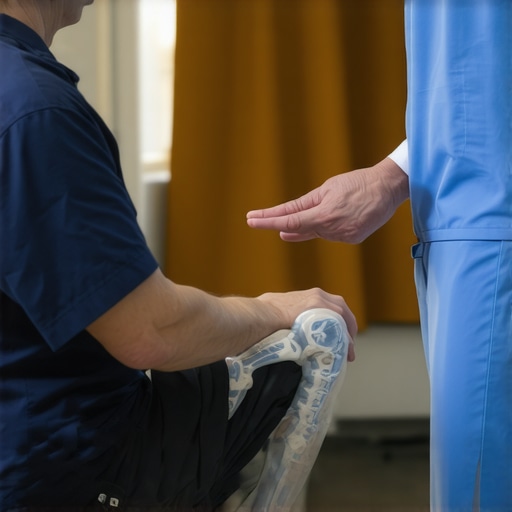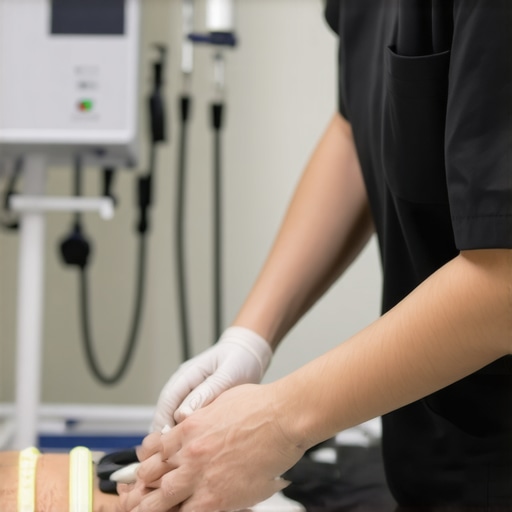My Journey Through Workers’ Compensation Orthopedic NJ: An Unexpected Lesson
Last year, I found myself unexpectedly injured while working on a construction site here in New Jersey. The pain was intense, and I knew I needed to understand my options for treatment under workers’ compensation. This personal experience opened my eyes to the complexities and importance of proper orthopedic care in NJ, especially when it comes to work-related injuries.
Understanding the Critical Role of Orthopedic Care in Workers’ Compensation
When I first sought medical help, I realized that not all doctors are equally equipped to handle work injury cases. I learned that choosing a specialist familiar with NJ workers’ compensation laws and orthopedic treatments can make a significant difference in recovery outcomes. According to top orthopedic spine specialists in NJ, specialization and experience are key for effective treatment.
My Personal Experience with Orthopedic Treatments for Work Injuries
The treatment process involved a thorough evaluation, including diagnostic imaging and personalized therapy plans. I was surprised to discover how many non-surgical options are available, such as physical therapy and minimally invasive procedures. For example, I found that non-surgical care can be highly effective for herniated discs, as discussed in effective non-surgical care for herniated discs.
What I Wish I Knew Before Starting Treatment
One thing I wish I had known is the importance of detailed documentation and proper communication with my medical team. This not only ensured my treatment was covered under workers’ comp but also helped me avoid unnecessary delays. If you’re navigating a similar situation, I recommend reviewing orthopedic documentation tips for injury claims in NJ.
How Can I Ensure I Get the Best Care During My Workers’ Compensation Case?
To maximize your recovery, it’s crucial to work with experienced orthopedic surgeons who understand workers’ compensation laws. I also found that exploring minimally invasive treatments, like those explained in minimally-invasive back pain treatments, can lead to faster recovery and less downtime.
If you’re facing a similar challenge or want to learn more, I encourage you to reach out to a trusted NJ orthopedic provider. You can start by contacting a specialist through their contact page to discuss your case and treatment options.
Have you experienced a work-related orthopedic injury? Share your story or tips in the comments below — your insights could help someone else navigate their recovery journey with confidence!
Mastering the Art of Orthopedic Care for Work Injuries in NJ: Expert Tips and Insights
When it comes to navigating the complexities of work-related orthopedic injuries in New Jersey, understanding the nuances of treatment options and legal considerations is essential. As an experienced orthopedic specialist, I often encounter patients who are unsure about the best course of action. From choosing the right surgeon to exploring minimally invasive procedures, there are key strategies that can significantly influence recovery outcomes.
How Can Specialized Orthopedic Care Accelerate Your Recovery?
Specialized orthopedic care tailored to work injuries ensures that patients receive treatment that aligns with NJ workers’ compensation laws and injury specifics. For instance, early intervention with diagnostic imaging, such as MRI or X-rays, can accurately identify the injury’s extent, enabling targeted treatment plans. Moreover, selecting an orthopedic surgeon experienced in work injury cases, as highlighted in top-rated orthopedic surgeons in Mahwah, NJ, can make a difference in both surgical and non-surgical outcomes.
What Are the Latest Advances in Non-Surgical Treatments for Work Injuries?
Non-surgical options continue to evolve, offering effective relief with minimal downtime. Techniques like platelet-rich plasma (PRP) injections, nerve blocks, and physiotherapy are increasingly popular. These modalities can reduce pain and promote healing, especially for soft tissue injuries or herniated discs. For example, exploring orthopedic injections can provide targeted pain relief without the risks associated with surgery. Additionally, minimally invasive procedures, explained in minimally-invasive back pain treatments, are becoming standard for faster recovery.
How Do I Identify the Right Time for Surgical Intervention?
Deciding when to proceed with surgery can be challenging. Factors such as persistent pain, neurological deficits, or loss of function often indicate the need for surgical repair. An expert assessment should include comprehensive diagnostic imaging and functional evaluation. For instance, lumbar fusion or discectomy might be necessary if conservative treatments fail. It’s crucial to work with a surgeon who understands the legal and medical intricacies involved in workers’ compensation cases. For guidance on surgical options, consider reviewing laser spine surgery risks and benefits.

Image illustrating a consultation between an orthopedic surgeon and a patient discussing treatment options for a work injury, highlighting diagnostic imaging and surgical planning.
How Can You Maximize Your Long-Term Recovery and Return to Work?
Post-treatment rehabilitation is vital. Structured physical therapy, ergonomic workplace modifications, and ongoing medical supervision can prevent re-injury and promote full recovery. For example, following protocols outlined in orthopedic rehab tips after lumbar fusion surgery can help patients regain mobility and strength. Staying proactive with follow-up care and maintaining open communication with your healthcare provider are key strategies for a successful outcome.
If you’re seeking personalized advice, don’t hesitate to contact a trusted NJ orthopedic provider through their contact page. Sharing your injury story or asking questions in the comments can also foster community support and shared knowledge among those navigating similar challenges.
Reflecting on my personal journey with orthopedic treatment for work injuries in NJ, I realize that the journey doesn’t end once the initial treatment is complete. As I delved deeper into the complexities of orthopedic care, I uncovered layers of nuance that can significantly influence long-term recovery and overall well-being. One aspect that resonated with me is the importance of integrating multidisciplinary approaches to treatment, combining surgical expertise with physical therapy, mental health support, and ergonomic adjustments.
For instance, I learned that addressing psychological factors such as anxiety or depression related to injury and recovery can improve outcomes. Studies, like those published in the Journal of Occupational and Environmental Medicine, emphasize that a holistic approach fosters better healing and return-to-work success. This insight pushed me to consider how mental resilience and lifestyle modifications play a role alongside medical interventions.
Furthermore, I found that ongoing research into regenerative medicine offers promising avenues. Techniques like stem cell therapy and platelet-rich plasma (PRP) injections are gaining traction for their potential to promote natural healing processes, reducing dependence on invasive procedures. Exploring non-surgical care options that harness these advances could be transformative for many patients.
One lesson I wish I had internalized earlier is the significance of personalized rehabilitation programs. Every injury is unique, and a tailored plan that considers individual work demands, lifestyle, and recovery pace can make all the difference. Working closely with a dedicated physical therapist—who understands the intricacies of NJ workers’ compensation laws and orthopedic best practices—can optimize results. I found that early and consistent engagement in rehab prevents re-injury and builds strength gradually.
As I continue my journey, I realize that staying informed and proactive is vital. Sharing stories and insights, like those in the comments or on community forums, can empower others to navigate their recovery with confidence. If you’re facing similar challenges, I strongly encourage you to explore comprehensive treatment options and consider consulting specialists who embrace a holistic, patient-centered approach. For personalized guidance, visiting a trusted NJ orthopedic provider through their contact page is a great first step.
Remember, recovery is not just about healing physically—it’s about reclaiming your quality of life and returning to the activities you cherish. Embrace the journey with patience, knowledge, and the support of experienced professionals. Your resilience and proactive attitude can truly make a difference in achieving lasting recovery and long-term health.
Leveraging Multidisciplinary Approaches for Sustainable Recovery
During my extensive experience with orthopedic treatments for NJ work injuries, I’ve come to appreciate the critical importance of a multidisciplinary approach. Integrating surgical expertise with physical therapy, mental health support, and ergonomic workplace modifications creates a comprehensive recovery ecosystem. This holistic strategy not only accelerates healing but also fosters resilience against future injuries.
The Psychological Dimension of Orthopedic Rehabilitation
Addressing psychological factors such as anxiety, depression, or fear of re-injury can significantly influence recovery outcomes. According to a study published in the Journal of Occupational and Environmental Medicine, mental resilience enhances physical healing. Incorporating counseling or support groups into treatment plans can empower patients, helping them stay motivated and engaged throughout their rehabilitation journey.
Emerging Regenerative Technologies and Their Potential
Recent advancements in regenerative medicine, including stem cell therapy and platelet-rich plasma (PRP) injections, offer promising avenues for non-invasive healing. These techniques harness the body’s natural repair mechanisms, potentially reducing the need for invasive surgeries. Exploring these options with a qualified orthopedic specialist can open new possibilities for personalized treatment plans. For detailed insights, consider reviewing non-surgical care options.
The Power of Personalized Rehabilitation Protocols
Every injury and individual is unique, which underscores the importance of tailored rehabilitation programs. Collaborating closely with physical therapists who understand the nuances of NJ workers’ compensation laws and orthopedic science ensures recovery strategies align with personal work demands and lifestyle. Early engagement in therapy, combined with gradual strength rebuilding, minimizes the risk of re-injury and promotes long-term mobility.
Engaging with Expert Care for Long-Term Health Maintenance
Regular follow-up appointments and ongoing education about ergonomic practices are vital for maintaining spinal health. I recommend seeking out specialists who prioritize patient education and ongoing support. For those interested in exploring expert insights or personalized advice, reaching out through their contact page can be a proactive step. Sharing your recovery experiences in community forums can also foster peer support and collective learning.
What Are the Latest Innovations in Orthopedic Treatments That Could Transform Long-Term Outcomes?
Innovations such as biologic therapies, minimally invasive surgical techniques, and smart wearable devices are revolutionizing orthopedic care. These technologies enable more precise interventions, real-time monitoring, and personalized adjustments, enhancing recovery trajectories. Staying informed about these developments can empower patients to make proactive decisions. For an in-depth look at minimally invasive options, visit this resource.

Image illustrating a multidisciplinary team collaborating on a patient’s personalized orthopedic treatment plan, emphasizing integrated care approaches.
Things I Wish I Knew Earlier (or You Might Find Surprising)
1. The Power of Choosing the Right Specialist
Looking back, I realize that selecting an orthopedic surgeon experienced in workers’ compensation cases truly made a difference in my recovery. Not all doctors are familiar with NJ laws, and that can impact coverage and treatment options. Trusting a specialist who understands both medical and legal nuances eased my journey significantly.
2. Non-Surgical Options Can Be Life-Changing
I was surprised to learn how effective treatments like physical therapy, PRP injections, or nerve blocks can be, often avoiding the need for surgery. For many injuries, these minimally invasive procedures can speed up recovery and reduce downtime, which is a game-changer for workers eager to return to work.
3. The Importance of Detailed Documentation
Keeping meticulous records and communicating clearly with your healthcare team can prevent delays in your workers’ comp claim and ensure your treatment is covered. I wish I had understood this earlier, as it could have saved me weeks of unnecessary stress.
4. Recovery Isn’t Just Physical — It’s Mental Too
Addressing psychological factors like anxiety or depression during recovery can significantly improve outcomes. Incorporating mental health support or counseling helped me stay motivated and focused on healing.
5. Advances in Regenerative Medicine Are Exciting
New techniques such as stem cell therapy and PRP are promising options that harness your body’s natural healing abilities. Exploring these with a qualified orthopedic specialist could offer quicker, better long-term results.
Resources I’ve Come to Trust Over Time
- American Academy of Orthopaedic Surgeons (AAOS): Their website offers comprehensive, evidence-based information on orthopedic conditions and treatments. I recommend it for anyone wanting to understand their options better.
- National Institute of Arthritis and Musculoskeletal and Skin Diseases (NIAMS): A trustworthy source for latest research and patient-friendly explanations, helping me stay informed about innovative treatments.
- New Jersey Orthopedic Society: Local resources and directories of specialized surgeons familiar with NJ workers’ compensation laws.
Parting Thoughts from My Perspective
Reflecting on my experience with orthopedic care in NJ, I’ve learned that informed choices and proactive communication are key. Whether you’re dealing with a work injury or chronic pain, understanding your treatment options—especially non-surgical ones—and working with specialists who genuinely understand your legal rights can make all the difference. If this story resonates with you, I encourage you to reach out to a trusted NJ orthopedic provider through their contact page. Your recovery journey is personal, but you don’t have to navigate it alone. Share your own experiences or questions in the comments — we’re all in this together, and support is just a click away.

